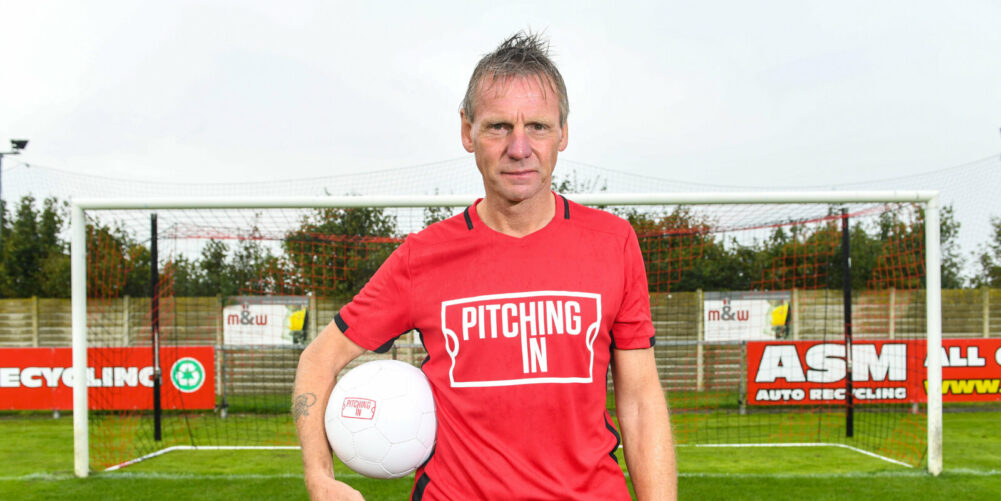Picture: Doug Peters/PA Wire
Trident’s Nick Robinson, Mark Harris and Anthony Hughes welcome on board Step 3-4’s new partners
Non-League Paper: This is a unique partnership which has come at a difficult time, you must be very happy to secure the new sponsorship with GVC and the Pitching In idea?
Nick Robinson: It was exactly what we’re looking for. I’m sure there will be some cynical people out there who say it’s just another way for them to get publicity, but I think the more we spoke to them, the more we were genuinely impressed by what they were driven by, they’re very community-driven.
Mark Harris: Had they come to us and said we want to sponsor as Ladbrokes Coral, we would have had to have thought very long and hard about a like-for-like replacement for BetVictor.
They recognise the value and importance of our level of the game and crucially what makes it tick i.e. community and volunteers. They’ve got that from the very first instance.
The Trust element to this is absolutely unique. There will be those who choose to be cynical and say it’s betting under a different name. These will be the same people who, 12 months ago, said betting companies don’t put anything back into football.
Here is a betting company –we’re not hiding from the fact it’s GVC who own Ladbrokes and Coral – putting its money back into football without any commercial return. That for me is fairly unique. It is a corporate social responsibility play and we’re delighted to be beneficiaries of that.
Anthony Hughes: This is about giving back something to the community rather than the traditional betting route of sponsorship.
MH: One of the biggest challenges we have is to convince others there isn’t another agenda. Success for GVC will be measured in two things: the general awareness of the Pitching In concept as an investment programme and the number of applications for grants.
There’s no links to website, no data capture. By having a level of compliance that is realistic and achievable, that I think will play a massive part in delivering this sponsorship.
AH: It’s a lot less complicated for clubs. This is the first time ever that we’ve done any sort of sponsorship deal where the clubs can apply for a cash incentive to complete projects. I think we all hope it will allow clubs to buy into it that much more. It’s more about them than it is about the leagues.
NR: Pitching In didn’t exist before they started talking to us, they had their elite sports campaign but they’re putting all that under this banner. We’ve got a company the size of GVC actually working around us to accommodate us. That’s the other thing that has impressed us, it’s not a sponsorship as such, it’s a partnership.
We also talked with them about doing learning webinars for players in football, not just betting on football, but gambling generally.
One of the reasons for working with a gambling company is it enables us to put in place this education and integrity which has not been available to us traditionally. Our partners GVC are all about responsible gambling. One of our aims is to educate people about the ills but also that it’s not allowed (for participants to bet on football).
MH: GVC operate on five different continents, there is a huge social conscious to corporate responsibility. They employ 15,000 people, they encourage a lot of volunteering in their work force.
What’s also really important is we manage expectation, we’ve not got a multi-million pound pot from day one. They are investing an annual sum. That’s the starting point, it enables us to put the messaging out to clubs.
The fund, to start off, is going to be limited. What we want to do is build up that fund by encouraging other stakeholders in the game to come and join us. It isn’t a case of clubs being handed money bluntly to spend on a centre-forward.
AH: They’ve signed a two-year deal with an option for a third. They speak regularly about a long-term partnership with a minimum of five years so it’s important for us to nurture the relationship because over that five years it could be extremely lucrative for the clubs at our level.
NR: We’re going to announce more detail about the Trust later in the month. The intention of the fund is to help small and large projects. We can make a difference and that’s what Pitching In is all about.
MH: We need to look at this in the bigger picture of funding at our level of the game. The Matchday Fund, via the Premier League, is an important milestone and recognition the communities our clubs serve fulfil a really important role locally. The Premier League need to be congratulated for that.
NLP: We’ve seen limited crowds return to games in recent weeks. From what you’ve seen, how are clubs coping with the new protocols and what’s the feedback been like?
MH: We actually, sometimes, don’t give our clubs enough credit for how creative they are and how they’re rising to this challenge.
AH: The clubs have been fantastic, the response we’ve had has been nothing but positive. They are willing to do whatever it takes and to follow whatever rules they’re given to make sure it is done properly.
I’m seeing it very much as a pilot exercise, I get the impression everyone’s watching to see how it goes and if we want to progress, it has to go well.
NR: The feedback I’m getting from my board is exactly the same.
I went to match on Tuesday at a Step 5 club and, to be honest, they paid lip service to it. They had evePass but they weren’t enforcing people to do it. It’s voluntary track and trace but that’s not what it’s about. It’s about actually wanting to buy into the system.
NLP: That’s going to be key in avoiding any setbacks…
MH: The message is getting through but what concerns me, as Nick has highlighted, there will be those out there who think they won’t get caught.
The reality is it won’t be the Southern League, Isthmian league or Northern Premier going around and closing grounds, it will be the local authorities. That bit doesn’t seem to have sunk in.
The Prime Minister has given the responsibility to local authorities which will mean the local restrictions applied are not going to be consistent.
AH: We’ve got clubs in our league where the local authorities have come in and said regardless of the capacity The FA gave you, we are setting it at this, which is much less. There’s nothing we can do about that. Local authorities are taking different approaches and it’s something we’re going to have to keep monitoring. This is where I think it’s crucial clubs react properly.
NR: If the local authority sent someone to the game I was at I think they would have been very concerned. Clubs have got to buy into this. I think at Step 3 and 4 our clubs have.
NLP: All three leagues have been vocal in wanting the limitations to move to 30 per cent of ground capacity, how optimistic are you that will follow soon?
MH: It would be wrong of us to set a time limit on it, what we’re already doing, the three of us, is keeping the momentum up for that. I don’t think there’s a particular trigger point, we’re pushing for it to be looked at the earliest opportunity.
We haven’t kicked a ball in league action yet, I would have thought it would be sensible to be looking at it at the start of October. We can’t control what government agrees to but it’s up to us to work with our clubs to see if there are credible solutions and proposals that can be taken to the DCMS, that demonstrate the clubs who have larger footfall can accommodate their fans safely, there are robust operational plans and above all fan safety can be demonstrated.
AH: We’ve seen how The FA negotiate with the DCMS and how tricky and how difficult that’s been with all the intricacies of getting them to make that decision to allow 15 per cent and then 30 per cent of ground grading. We appreciate that perhaps more than the clubs do at the moment because we’ve seen the hoops they’ve had to go through.
NLP: How are discussions going regarding contingency plans should the season be interrupted?
NR: Before September 19 we need to come back to clubs with what is going to happen in certain scenarios. I had two webinars with my clubs last week discussing solutions, such as points per game or null and void. We talked about having 0-0 draws if matches aren’t played. We got their views. We haven’t put specific things to them we just said, ‘what do you think?’. We can honestly look everyone in the eye and say we’ve consulted our clubs. Our board will make the final decision.
MH: We’ve done exactly the same.
AH: Likewise. It’s very difficult to get a solution for everything that could possibly go wrong throughout the season.
MH: The clubs realise the number of variables out there. Take points per game, for example. What if we have one round of games, there’s a huge spike and we never play again, do we determine things on one game? Everybody would say that’s not possible. After a bit of discussion, you probably come to around a figure of determining things on 50 per cent of fixtures. But is that every club who have played 50 per cent? What about a club that might have played 48 or 49?
AH: It’s not just within one league too, it’s across three or four leagues.
MH: Exactly, is it 50 per cent across the Step? In Anthony’s league they may have played 75 per cent of games and up in the frozen north, we’ve only played 45 per cent. Is that credible?
It’s very difficult to give clear guidance beyond the general principle. As Nick says, we absolutely want to give our clubs as much clarity as possible, but we can’t paint ourselves into a corner by coming up with a whole pile of things that are unworkable in the light of the circumstance at the time.
NR: You could have one club that’s got to the FA Cup third round and have fallen behind on their league fixtures, they may be the only one out of 226 clubs that hasn’t done 50 per cent. Is that enough to veto the solution?
Before the 19th we will notify clubs how we propose to look at this. Nothing’s going to be written in stone, but we’re saying this how we’re looking at it when the scenarios come up. We’ve consulted with you and this is what you’ve indicated to us.
The leagues have never worked together so well than in the last few years. I think it’s wonderful.
MH: That’s where the Trident concept came from. Although we may autonomous competitions, and there are things we do differently, we want to be as consistent as we can be. Clubs get laterally transferred and, at the end of the day, we’ve all got the same challenges, the same DNA, the creation of the Trident gives us an identity. If we are to compete and be taken seriously and have one voice, that’s the value of the Trident.























